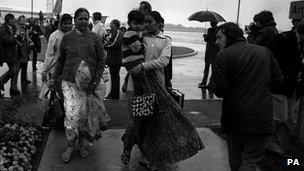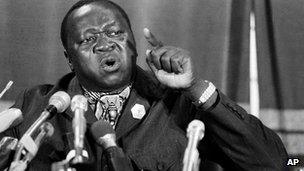MPs and peers pay tribute to Ugandan Asians
- Published

Many Ugandan Asians arrived in the UK with little money and few possessions
Ugandan Asians expelled from the East African country have "become part of the fabric of our nation," Tory MP Shailesh Vara has said.
MPs and peers were paying tribute to the contribution of Ugandan Asians, 40 years after thousands were forced out by dictator Idi Amin.
Mr Vara said the community had "punched above their weight in Britain".
Lord Popat said Ugandan Asians had shown integration was the most important element of immigration.
In 1972, Ugandan dictator Idi Amin ordered Asians living in the country who had not taken Ugandan citizenship - an estimated 60,000 people - to leave within 90 days.
Amin exploited resentment towards Asians in Uganda at the time, which persisted partly as a result of their success in the business and civil service sectors.
Some 30,000 Ugandan Asians with British overseas passports arrived in the UK and almost all were granted asylum.
'Courageous decision'
In spite of protests from some politicians that India should take responsibility for the refugees, then Prime Minister Edward Heath said Britain had a duty to accept them.
During a backbench debate in the Commons, Mr Vara, who was born in Uganda but whose family left in 1964, said: "Speaking as a whole for the community, there can be no doubt that this is a community that has punched above its weight in Britain.
"The Ugandan Asians who have settled here have in the past 40 years truly settled and they've truly integrated and become part of the fabric of our nation."
And he praised Mr Heath's "courageous decision" that both morally and legally Britain had an obligation to take in the refugees.
He said: "This was a time when Britain was at its best.
"Having accepted responsibility for these refugees, we then had voluntary groups, church groups, charity groups and just ordinary citizens coming out to help these refugees.
"They showed their warmth, their compassion and their care for their fellow human beings."
Liberal Democrat Simon Hughes said he was a student at the time the government took the decided to welcome the refugees.
He said it showed "foreigners... can be an asset not a disadvantage" and that this should be remembered when "we address the inevitable plight of other people who may in the future look to use for help... when their governments turn on them".
Chair of the Home Affairs Committee Keith Vaz, who is originally from Yemen, said he believed there was more to come from Ugandan Asians in Britain.
"The next generation is going to be the golden generation because of the contribution they can make, not as first generation immigrants, but as equal citizens of this country," he told MPs.
'Great success story'
Leading the debate in the House of Lords, Lord Popat, a Ugandan Asian who moved to the UK in 1971, said Mr Heath's government "rose above the rhetoric of Enoch Powell and others and demonstrated the compassion I have come to associate with this country".
"So often our national debate on immigration comes down to numerical details. I would argue that integration is a more important element," he said.
"If you are willing to work hard, learn the language and give back to this great nation, most people do not mind about your skin colour or where you come from."

Idi Amin exploited resentment towards Asians in Uganda
And he credited the Ugandan Asians with "transforming the shopping experience" for British people, introducing "late-night shopping and Sunday opening".
Lord Cormack, a former Conservative MP who was first elected in 1970, said although he was a "great friend of Enoch Powell" he "wasn't right on everything".
He said he was "proud" to have been in the Commons at the time to support "a prime minister who was doing what was right".
Foreign Office Minister Lady Warsi said: "Although many Ugandan Asians were forced to leave everything behind, one thing that Amin could not force them to relinquish was their strength, their skills and their flair as entrepreneurs.
"That is something they brought here in abundance and we see evidence of that every day."
She said the community was one of Britain's "great success stories" and was continuing to "make their mark in every corner of society".
The Ugandan Asians had "turned dispossession into opportunity and tragedy into success", she added.
- Published25 November 2012
- Published10 September 2012
- Published6 August 2012